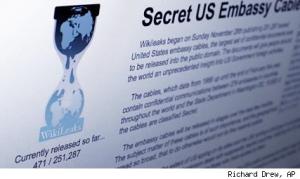 NEWS
NEWS
 NEWS
NEWS
 NEWS
NEWS
![]() It’s business as usual once again for the folks at WikiLeaks (if such a thing is possible) as the document-sharing site appears to be back online following a sustained distribute denial of service (DDoS) attack that lasted for more than one week.
It’s business as usual once again for the folks at WikiLeaks (if such a thing is possible) as the document-sharing site appears to be back online following a sustained distribute denial of service (DDoS) attack that lasted for more than one week.
Julian Assange and his team will no doubt be extending an almighty “thank you” to a small web performance and security company known as CloudFare, which has apparently heeded WikiLeaks call for help on Twitter.
The source of the DDoS attacks remains uncertain, although a ‘group’ calling itself AntiLeaks has taken to Twitter to claim responsibility for taking the whistleblowing site offline in an offensive that also knocked out numerous mirror sites of WikiLeaks.
CloudFare, which previously assisted hacking group LulzSec when its site was taken down in a similar attack, offers a service known as a “reverse proxy” that is able to block illegitimate traffic by rerouting all incoming requests through its own servers. Essentially, CloudFare acts as a kind of firewall in the cloud. According to TechCrunch, the service handles roughly the same amount of traffic as Yahoo does each day, which means that it’s more than capable of distinguishing legitimate traffic from the more subversive kind.
This latest development comes as the hacker group Anonymous warns of a protracted cyber war involving pro-WikiLeaks and anti-WikiLeaks parties. WikiLeaks stands on one side of the divide alongside its liberally-minded supporters, while the US government apparently heads up those opposing them.
Anonymous are of course vocal supporters of WikiLeaks, coming to their aid during the time the site was taken off air with not one, but two ways of accessing its ‘forbidden’ content. First, they provided a method of viewing WikiLeaks using Tor, an open network that aims to defend internet users against surveillance that threatens personal freedoms and privacy. Second, Anonymous posted a list of unaffected WikiLeaks mirror sites, including one known as Global Files, which is speculated to contain the highly-sensitive files that provoked the DDoS attacks in the first place.
The files in question belong to the private intelligence firm Stratfor, and apparently discuss the implementation of a secret surveillance system known as TrapWire in public spaces in the United States.
Support our mission to keep content open and free by engaging with theCUBE community. Join theCUBE’s Alumni Trust Network, where technology leaders connect, share intelligence and create opportunities.
Founded by tech visionaries John Furrier and Dave Vellante, SiliconANGLE Media has built a dynamic ecosystem of industry-leading digital media brands that reach 15+ million elite tech professionals. Our new proprietary theCUBE AI Video Cloud is breaking ground in audience interaction, leveraging theCUBEai.com neural network to help technology companies make data-driven decisions and stay at the forefront of industry conversations.